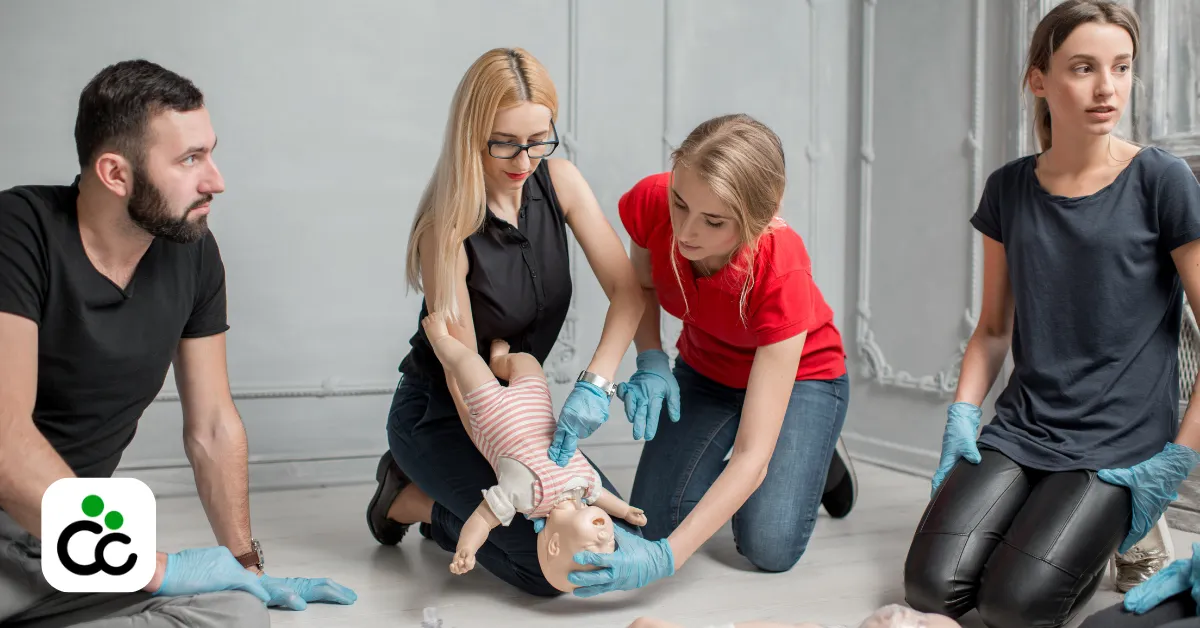Childcare is not just a service, it is a crucial component of a child's early development and well-being. Quality childcare can profoundly impact a child's social, emotional, and cognitive development, setting the foundation for their future success.
However, ensuring quality childcare is not solely dependent on the available facilities or resources—it heavily relies on the childcare providers' and staff's knowledge, skills, and expertise.
Quality childcare plays a fundamental role in shaping a child's early experiences and laying the groundwork for their future development. During the early years of life, children are incredibly receptive to their surroundings, making the quality of care they receive during this time critical.
Research has consistently shown that high-quality childcare can lead to better cognitive and social-emotional outcomes for children, preparing them for success in school and beyond.
Furthermore, quality childcare supports working families by providing children with a safe and nurturing environment while parents or guardians work.
In this blog, we will look into the significance of childcare training for both providers and staff. We will explore how training contributes to ensuring the safety and well-being of children, enhancing the quality of care provided, meeting regulatory standards, building trust with parents, and retaining qualified staff.
By understanding the importance of training in the context of childcare, we can better appreciate its role in promoting positive outcomes for children and families.
#About Child Care Training

Childcare training encompasses a diverse range of educational programs, workshops, and certifications designed to equip childcare providers and staff with the knowledge, skills, and competencies necessary to deliver high-quality care to children.
It involves learning about child development, safety protocols, effective communication techniques, and nurturing environments conducive to children's growth and well-being.
#Various Forms of Training Available
Online Courses: With the help of technology, online childcare courses have become increasingly popular. These courses offer flexibility and convenience, allowing childcare providers and staff to learn at their own pace and schedule.
Workshops and Seminars: In-person workshops and seminars provide opportunities for interactive learning, networking, and hands-on training. They often cover specific topics such as first aid, behavior management, and early childhood education.
Certifications: There are various certifications available for childcare professionals, such as CPR and first aid certification, Child Development Associate (CDA) credential, and Early Childhood Education (ECE) certification. These certifications demonstrate a commitment to professional development and excellence in childcare.
On-the-Job Training: Many childcare facilities provide on-the-job training for new hires, where experienced staff members mentor and guide them through the daily responsibilities and best practices in childcare.
#Importance of Ongoing Training and Professional Development
Continuous learning and professional development are essential in the field of childcare due to the ever-evolving nature of early childhood education and the needs of children. Here's why ongoing training is crucial:
Keeping Up with Best Practices: Childcare training helps childcare service providers and staff stay updated on the latest research, trends, and practices in early childhood education, ensuring that they can provide the highest quality of care.
Enhancing Skills and Competencies: Ongoing training allows childcare professionals to enhance their skills in areas such as communication, problem-solving, and child development, enabling them to better meet the needs of the children under their care.
Adapting to Changing Regulations: Childcare regulations and standards may change over time. Ongoing training ensures that providers and staff remain compliant with regulatory requirements and maintain a safe and nurturing environment for children.
Fostering Career Growth: Professional development opportunities in childcare can lead to career advancement and increased job satisfaction for providers and staff. By investing in training, childcare facilities can attract and retain talented individuals who are passionate about early childhood education.
#Ensuring Child Safety and Well-being

#A. Importance of Understanding Child Development and Behavior
Childcare providers and staff must have a deep understanding of a child’s development to effectively meet the needs of the children under their care.
Knowledge of developmental milestones allows providers to create age-appropriate activities and environments that promote learning and growth.
Understanding children's behavior helps providers anticipate and address challenges, fostering positive interactions and relationships.
With training in child development, providers can recognize signs of developmental delays or concerns early on, facilitating timely intervention and support for children.
#B. Training in Safety Protocols and Emergency Procedures
Childcare settings must prioritize the safety and well-being of children at all times.
Training in safety protocols equips childcare providers and staff with the necessary skills to create a secure environment, including measures for preventing accidents and injuries.
Emergency preparedness training ensures that providers know how to respond calmly and effectively in crises such as medical emergencies, natural disasters, or lockdowns.
Regular drills and practice sessions reinforce safety procedures and help providers feel confident in their ability to keep children safe during unexpected events.
#C. How Training Enhances Staff's Ability to Recognize and Respond to Child Abuse or Neglect?
Childcare training includes education on recognizing the signs of child abuse or neglect, as well as the legal obligations and reporting procedures.
Through training, providers gain insight into the behavioral, physical, and emotional indicators of abuse or neglect, enabling them to intervene and seek help when necessary.
Training empowers staff to approach sensitive situations with compassion, professionalism, and confidentiality while prioritizing the safety and well-being of the child.
By training childcare service providers with the knowledge and skills to identify and address child abuse or neglect, training plays a critical role in safeguarding children and ensuring their protection in childcare settings.
#Meeting Regulatory Standards and Requirements

#A. Overview of State and Federal Regulations for Child Care Providers
Childcare facilities are subject to strict regulations and standards set forth by both state and federal authorities to ensure the safety, health, and well-being of children.
State regulations may include requirements for staff-to-child ratios, health and safety practices, staff qualifications, facility cleanliness, and more.
Federal regulations, such as those outlined by agencies like the U.S. Department of Health and Human Services, may also govern aspects of childcare facilities, particularly those that receive federal funding or subsidies.
#B. Importance of Training in Meeting Licensing Requirements
Childcare providers and staff are often required to undergo specific training as mandated by state licensing agencies to obtain and maintain their licenses.
Training may cover topics such as child development, safety protocols, emergency preparedness, CPR and first aid certification, and mandated reporting procedures for child abuse or neglect.
Meeting licensing requirements through training demonstrates a commitment to professionalism, competence, and compliance with regulatory standards.
#C. How Trained Staff Contribute to Maintaining a Safe and Compliant Child Care Facility?
Trained staff are better equipped to implement and uphold the policies and procedures outlined in regulatory standards, ensuring the safety and well-being of children.
Through their training, staff members gain the knowledge and skills to create and maintain a safe environment, from proper sanitation practices to emergency response protocols.
Trained staff to understand the importance of documentation and record-keeping to demonstrate compliance with licensing requirements, including maintaining accurate staff qualifications and child health records.
By staying informed about updates and changes to regulations, trained staff can proactively adapt their practices to remain in compliance and uphold the highest standards of care for the children they serve.
#Impact of Training on Staff Satisfaction
Training opportunities have a significant impact on staff satisfaction and morale in childcare settings. When childcare providers invest in training for their staff, it demonstrates that they value their employees' professional development and growth.
Staff members who receive training feel more confident and competent in their roles, leading to increased job satisfaction and a sense of fulfillment.
Training enhances staff morale by providing opportunities for personal and professional growth, fostering a positive work environment where employees feel valued and supported.
#Opportunities for Career Growth
Training in childcare offers staff members opportunities for career advancement and progression.
By acquiring new skills and certifications through training, childcare providers and staff can expand their career opportunities within the childcare industry.
Advanced training programs, such as obtaining a Child Development Associate (CDA) credential or pursuing higher education in early childhood education, open doors for promotion to leadership positions or specialized roles within childcare facilities.
Offering pathways for career growth through training not only benefits individual staff members but also strengthens the childcare workforce by cultivating a skilled and knowledgeable pool of professionals.
#Final Say
Throughout this blog, we have explored the critical role that training plays in ensuring quality childcare for children.
From understanding child development and safety protocols to building trust with parents and retaining qualified staff, training is the cornerstone of excellence in childcare provision.
It helps providers and staff with the knowledge, skills, and competencies needed to create safe, nurturing environments where children can thrive and grow.
As we conclude, childcare facilities need to prioritize ongoing training and professional development for their staff.
By investing in training, facilities can enhance the quality of care they provide, meet regulatory standards, build trust with parents, and retain qualified staff.
Childcare providers should commit to offering comprehensive training programs, including workshops, certifications, and opportunities for career advancement, to ensure that their staff remains equipped to meet the evolving needs of children and families.
#FAQs
Why is childcare training important for childcare providers and staff?
Childcare training is crucial as it helps childcare providers and staff with essential knowledge and skills to ensure the safety, well-being, and development of children in their care.
What topics are covered in childcare training programs?
Childcare training programs cover a wide range of topics including child development, safety protocols, emergency procedures, behavior management, and communication skills.
What are the benefits of ongoing training for childcare providers and staff?
Ongoing training helps providers and staff improve their skills, stay compliant with regulations, enhance the quality of care they provide, and build confidence in their abilities.
Are there different types of childcare training available?
Yes, childcare training comes in various forms including online courses, workshops, seminars, certifications, and on-the-job training tailored to meet the diverse needs of providers and staff.
How does childcare training contribute to child safety?
Childcare training educates providers and staff on safety protocols, emergency procedures, and how to recognize and respond to potential hazards or risks, thus ensuring a safe environment for children.
Can childcare training help providers better understand child behavior?
Yes, childcare training often includes modules on child development and behavior management, helping providers understand and respond effectively to the unique needs and behaviors of each child.


